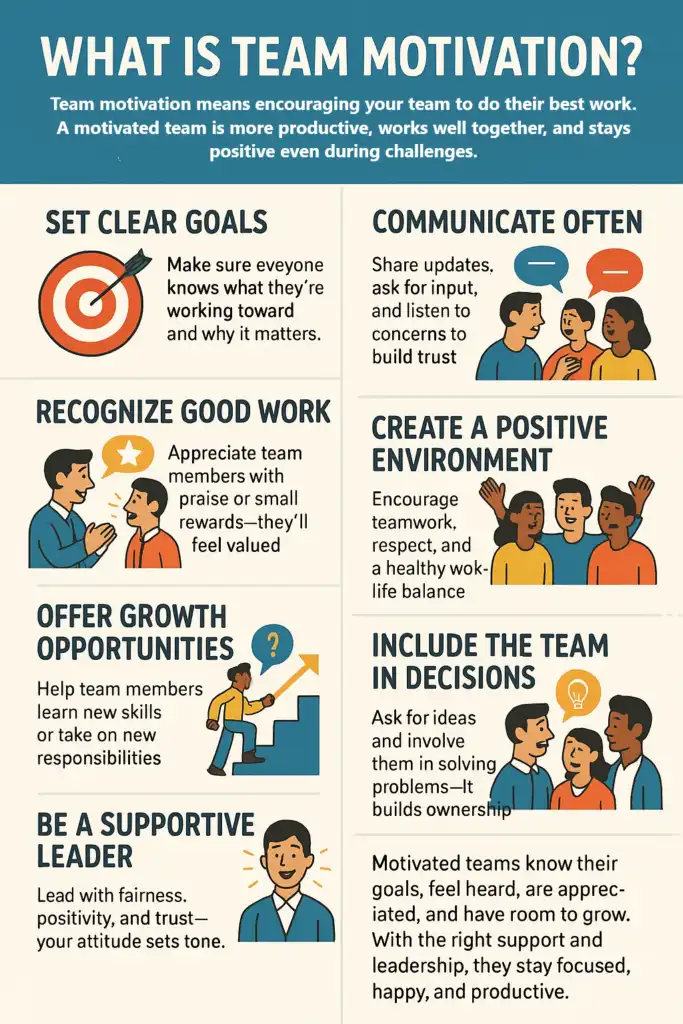Motivating your team means inspiring the people you work with to give their best effort. When a team is motivated, they work harder, feel happier, and achieve better results together.

A motivated team:
- Meets goals faster
- Has better teamwork
- Solves problems more easily
- Stays positive, even during tough times
Let’s go step-by-step to learn how to keep your team motivated and productive.
1. Set Clear Goals
People work better when they know exactly what they’re working toward.
- Make sure everyone understands the team’s goal.
- Break big goals into smaller tasks so it feels easier to reach.
- Let them know how their role matters in the bigger picture.
Example: Instead of saying “Let’s do better this month,” say “Let’s increase customer satisfaction by 10%.”
2. Communicate Often and Clearly
Good communication builds trust and keeps everyone on the same page.
- Keep your team updated on progress and changes.
- Ask for their ideas and feedback.
- Listen to their concerns and support them when needed.
Tip: Regular team meetings or quick check-ins help everyone stay connected.
3. Recognize and Appreciate Good Work
When people feel noticed and appreciated, they’re more likely to stay motivated.
- Say thank you when someone does a good job.
- Celebrate small and big successes.
- Give rewards like praise, certificates, or even small gifts.
Example: “Great job handling that customer complaint yesterday—your calm approach made a big difference!”
4. Create a Positive Work Environment
People do better in a friendly and respectful environment.
- Encourage teamwork, not competition.
- Avoid negativity or blaming.
- Support work-life balance and mental well-being.
Tip: A happy, relaxed team is more likely to perform well.
5. Give Opportunities to Grow
People feel more motivated when they see a future in what they’re doing.
- Offer training, workshops, or new responsibilities.
- Let team members try new things or lead small projects.
- Help them build new skills.
Example: “Would you like to lead the next meeting? It’s a great chance to try a leadership role.”
6. Involve the Team in Decision-Making
When people feel involved, they feel more responsible and motivated.
- Ask for their input before making big decisions.
- Let them help solve problems.
- Give them choices when possible.
Example: “What do you think is the best way to handle this task?”
7. Be a Good Leader
A motivated team often starts with a strong and supportive leader.
- Lead by example—work hard, be honest, and stay positive.
- Stay fair and respectful to everyone.
- Help your team solve problems instead of blaming them.
Tip: If your team trusts and respects you, they’ll naturally feel more motivated.
Get inspired with a collection of motivational words and quotes to keep your spirits high:
👉 Click here to view motivational words
[foogallery id=”13981″]
Summary :
To motivate your team for better results, set clear goals, communicate openly, and recognize good work. A positive environment, opportunities for growth, and involving the team in decisions can also boost motivation. Most importantly, being a supportive and fair leader helps the whole team stay energized and focused. When people feel valued and understand their role, they’re more likely to do their best and work together successfully.
Tags: achievement recognition, appreciation, best effort, better results, career opportunities, career progression, clear direction, clear goals, collaborative problem-solving, collaborative work, communication skills, concerns, Conflict Resolution, constructive feedback, continuous improvement, Decision Making, decision-making process, effective leadership, employee commitment, employee development, employee engagement, employee engagement strategies, employee feedback, employee growth, employee involvement, employee loyalty, employee morale, employee motivation, employee recognition, employee trust, employee well-being, empowerment, example, fairness, feedback, feedback loops, goal achievement, goal clarity, goal setting, goal-setting techniques, group achievements, group collaboration, group success, growth opportunities, honesty, inspiring, internal motivation, intrinsic motivation, involvement, job fulfillment, job satisfaction, leadership, leadership effectiveness, leadership impact, leadership influence, leadership opportunities, leadership qualities, leadership strategies, leadership support, mental well-being, morale boosting, motivation drivers, motivation strategies, motivation tactics, motivation techniques, motivational leadership, mutual respect, new responsibilities, opportunities, organizational culture, organizational success, peer support, performance goals, Performance Improvement, performance recognition, performance tracking, personal growth, positive reinforcement, positive work environment, positive workplace, positivity, praise, proactive communication, problem-solving, problem-solving skills, productivity, productivity boost, productivity enhancement, Professional Development, professional growth, professional relationships, progress updates, recognition, respect, responsibility, responsibility sharing, reward systems, rewards, role clarity, Skill development, skill enhancement, skill-building opportunities, small successes, Soft Skills Development, strategic goals, success celebration, support, supportive environment, supportive leadership, task delegation, task management, team accountability, team alignment, team autonomy, team cohesion, team collaboration, team communication, Team Development, team dynamics, Team empowerment, team encouragement, team energy, team feedback, team goals, team improvement, team input, team inspiration, team involvement, team meetings, Team motivation, team performance, team performance metrics, team productivity, team rewards, team spirit, team success, team synergy, team trust, team-building activities, team-driven results, team-driven success, team-focused goals, team-focused leadership, teamwork, teamwork culture, training, trust, trust-based culture, trust-building, work culture, work environment, work ethics., work goals, work goals alignment, work performance, work satisfaction, work-life balance, work-life integration, workplace morale, workplace positivity, workshops


